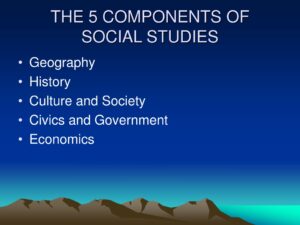Back to: Religion and National Value JSS 3
Welcome to class!
In today’s class, we’re going to be talking about the Components of Social Studies. I trust you will enjoy the class!
What are the Components?

Social Studies is like a puzzle, made up of different pieces that fit together to give us a complete picture of the world. The main components are:
- History:
What it is: The study of past events and how they have shaped the present.
Why it’s important: It helps us understand where we came from, how societies have evolved, and learn from the successes and mistakes of the past.
Example: Studying Nigeria’s history helps us understand the impact of colonialism, the struggle for independence, and how different ethnic groups and religions have interacted over time.
- Geography:
What it is: The study of the Earth’s physical features (landforms, climate, resources) and how people interact with their environment.
Why it’s important: It helps us understand the natural world, how different places are connected, and the challenges and opportunities that different environments present.
Example: Studying Nigeria’s geography helps us understand the diversity of its landscapes, the distribution of natural resources like oil and minerals, and the impact of climate change.
- Civics (Government and Citizenship):
What it is: The study of how governments work, the rights and responsibilities of citizens, and how people participate in decision-making.
Why it’s important: It helps us understand how our country is governed, our role as citizens, and how we can make a positive difference in our communities.
Example: Studying Nigeria’s government helps us understand the different levels of government (federal, state, local), the constitution, and how elections work.
- Economics:
What it is: The study of how people produce, consume, and distribute goods and services.
Why it’s important: It helps us understand how economies work, the challenges of scarcity and choice, and how our everyday decisions impact the economy.
Example: Studying Nigeria’s economy helps us understand the importance of oil production, the challenges of unemployment and poverty, and the role of the government in managing the economy.
- Culture and Religion:
What it is: The study of the beliefs, customs, traditions, and values that shape different societies.
Why it’s important: It helps us appreciate diversity, understand different perspectives, and build bridges between cultures.
Example: Studying the cultures and religions of Nigeria helps us understand the traditions of the Yoruba, Igbo, Hausa, and other ethnic groups, the role of Christianity and Islam, and the importance of festivals and celebrations.
History and Religion: Religious beliefs have often shaped historical events, and history can help us understand how religions have evolved over time.
Geography and Economics: The natural resources available in a place can influence its economy, and economic activities can impact the environment.
Civics and Culture: The values and traditions of a culture can influence how a government is formed and how citizens participate.
We have come to the end of today’s class. I hope you enjoyed the class!
In the next class, we shall be discussing contents of social studies.
In case you require further assistance or have any questions, feel free to ask in the comment section below, and trust us to respond as soon as possible. Cheers!
